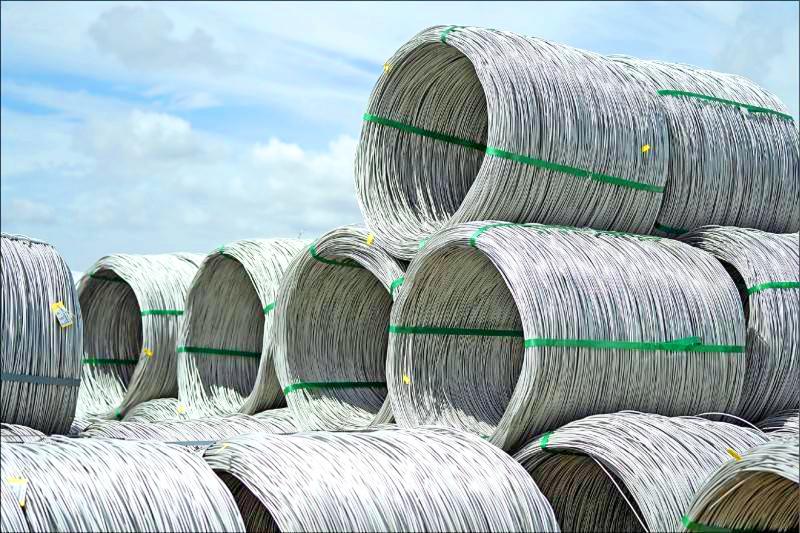Walsin Lihwa Corp (華新麗華) yesterday lowered the prices of 300-series stainless steel products for delivery next month by as much as US$250 per tonne, due to drops in nickel and other raw material costs, as well as dampened demand amid an uncertain global economy.
The series of cuts was the first since January, ending four consecutive months of price increases.
“The COVID-19 pandemic ruined the confidence of the stainless steel market. There are few orders and customers are using up inventories at a slower pace,” Walsin Lihwa said. “We are cutting our prices to match customer demand.”

Photo courtesy of Walsin Lihwa Corp
Walsin Lihwa said that it has cut prices by US$250 per tonne for all 300-series stainless steel products to be exported to overseas customers.
For local orders, the prices of the 300-series stainless steel products would drop by NT$7,000 per tonne, it said.
Walsin Lihwa kept the prices unchanged for other types of stainless steel.
The share price of Walsin Lihwa yesterday jumped 2.97 percent after it unveiled a plan to acquire a 70 percent stake for 210 million euros (US$225.29 million) in Cogne Acciai Speciali SpA, a leading stainless steel manufacturer in Europe.
The Italian stainless steel supplier counts Mercedes-Benz AG and BMW AG among its key customers.
“The investment not only broadens our international reach. Through our complementary product offerings, manufacturing capabilities, certifications and sales channels, we expect to be able to extract significant synergies, expand and develop products for new markets, and deliver value to our customers through manufacturing services,” Walsin Lihwa chairman Chiao Yu-Lon (焦佑倫) said in a statement.
The strategic alliance with Cogne Acciai Speciali would help expand Walsin Lihwa’s stainless steel business and enhance its competitiveness, Chiao added.
Cogne Acciai Speciali posted record revenue of 645 million euros last year, up 42 percent from the 2020 fiscal year.
The company makes 500,000 tonnes of stainless steel, mostly for the vehicle, aviation, medical and machinery sectors.

Real estate agent and property developer JSL Construction & Development Co (愛山林) led the average compensation rankings among companies listed on the Taiwan Stock Exchange (TWSE) last year, while contract chipmaker Taiwan Semiconductor Manufacturing Co (TSMC, 台積電) finished 14th. JSL Construction paid its employees total average compensation of NT$4.78 million (US$159,701), down 13.5 percent from a year earlier, but still ahead of the most profitable listed tech giants, including TSMC, TWSE data showed. Last year, the average compensation (which includes salary, overtime, bonuses and allowances) paid by TSMC rose 21.6 percent to reach about NT$3.33 million, lifting its ranking by 10 notches

Popular vape brands such as Geek Bar might get more expensive in the US — if you can find them at all. Shipments of vapes from China to the US ground to a near halt last month from a year ago, official data showed, hit by US President Donald Trump’s tariffs and a crackdown on unauthorized e-cigarettes in the world’s biggest market for smoking alternatives. That includes Geek Bar, a brand of flavored vapes that is not authorized to sell in the US, but which had been widely available due to porous import controls. One retailer, who asked not to be named, because

SEASONAL WEAKNESS: The combined revenue of the top 10 foundries fell 5.4%, but rush orders and China’s subsidies partially offset slowing demand Taiwan Semiconductor Manufacturing Co (TSMC, 台積電) further solidified its dominance in the global wafer foundry business in the first quarter of this year, remaining far ahead of its closest rival, Samsung Electronics Co, TrendForce Corp (集邦科技) said yesterday. TSMC posted US$25.52 billion in sales in the January-to-March period, down 5 percent from the previous quarter, but its market share rose from 67.1 percent the previous quarter to 67.6 percent, TrendForce said in a report. While smartphone-related wafer shipments declined in the first quarter due to seasonal factors, solid demand for artificial intelligence (AI) and high-performance computing (HPC) devices and urgent TV-related orders

MINERAL DIPLOMACY: The Chinese commerce ministry said it approved applications for the export of rare earths in a move that could help ease US-China trade tensions Chinese Vice Premier He Lifeng (何立峰) is today to meet a US delegation for talks in the UK, Beijing announced on Saturday amid a fragile truce in the trade dispute between the two powers. He is to visit the UK from yesterday to Friday at the invitation of the British government, the Chinese Ministry of Foreign Affairs said in a statement. He and US representatives are to cochair the first meeting of the US-China economic and trade consultation mechanism, it said. US President Donald Trump on Friday announced that a new round of trade talks with China would start in London beginning today,